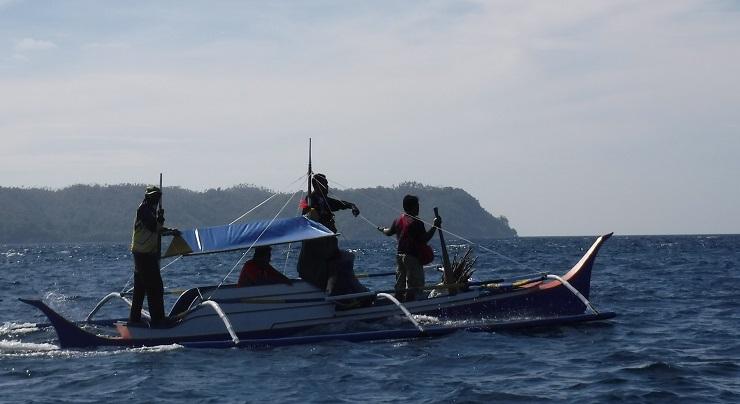ASIACALLING
Investigating Indonesia's illegal fishing trade: Part 1
"This 2-part series explores the illegal fishing trade from Indonesia and The Philippines "

Indonesia is an island nation, with roughly 18 000 islands. And between them, lies a vast expanse of sea, seething with fish.
The extensive area is difficult to patrol, and illegal fishing is rampant, with unregistered boats from neighbouring countries entering Indonesia’s waters, and taking huge hauls of fish.
This 2-part series explores the illegal fishing trade from Indonesia and The Philippines
It is a joint investigation by KBR, Jaring, and KataData. Here’s Part 1.
A small boat, six meters in length, precariously weaves it way through crashing waves. The noisy motor struggles through choppy waters. We’re heading to Sarangani Island in Davao, The Philippines, and to the home of Florita Mag Aso.
At home, she’s worrying for her husband Matthew Mag Aso and her two sons; Jeffrey and Jeric, who are now in an Indonesian jail.
“Matthew has been arrested probably around five times since he’s been involved in Tuna fishing,” Florita confessed. “My son Jeffrey has been arrested twice. According to Matthew and Jeffrey, of all the Filipinos detained in Indonesia, they have the longest sentences.”
Jeffrey is serving a five-year sentence, and his father Matthew, three years. On top of that, they have combined fines of $185 000 USD.
The Filipino men were found guilty of fishing inside Indonesian waters in January 2015. Matthew and Jeffrey were the Captains of two small ships, Garuda-05 and Garuda-06.
The boats were illegally fishing the Talaud waters of the Sulawesi Sea - that is, Indonesian waters close to The Philippines- when an Indonesian patrol boat caught them. The crew of another 17 Filipino ships were arrested at the same time.
The Indonesian city of Bitung in North Sulawesi, is known as “Kota Cakalang” or “Skipjack tuna City,” because of the wealth of tuna in surrounding waters. 312 nautical miles away, or 30-hours by boat, across the Sulawesi Sea, sits the Filipino Port of General Santos.
And that’s where Indonesia’s tuna is flowing, robbing Indonesia of fish that they rightfully own, claims Susi Pudjiastuti, Indonesian Minister of Maritime Affairs and Fisheries. She says catches are often transferred from one ship to another in the middle of the ocean.
“Transshipments take place in the middle of the sea,” Pudjiastuti explained. “From Bitung, our task force investigation found that of three catches in the area, two were taken to General Santos and just one was brought back to Bitung.”
Illegal, unreported, unregulated (IUU) fishing costs Indonesia at least an estimated $3 billion USD a year, according to the Association for South East Asian Nations (or ASEAN). And that’s just the cost of fish taken from Indonesia’s exclusive economic zone, not to mention ecological damage, and taxation not collected.
Neighbouring countries like Vietnam, Malaysia, Thailand and the Philippines fish in Indonesian waters because their own waters are depleted through overfishing and moratoriums on commercial fishing are often in place.
"So apparently they are desperate, because our neighboring countries have moratoriums on fishing in their marine territories,” said Pudjiastuti. “So the pressure to catch in our waters is huge.”
Since 2015, under Pudjiastuti’s leadership, Indonesia has patrolled its waters with renewed vigour, attempting to safeguard the nation’s food stocks and prosperity into the future.
There are now 35 patrol boats in waters to the north of Indonesia, as well as radars working to detect illegal fishing boats. In 2016 alone, at least 115 foreign ships were dramatically blown up and sunk at sea. Although sinking is intended as a deterrent measure, Susi maintains that illegal fishing continues unabated.
"We have introduced regulations and rules, but there are many violations. Many entrepreneurs are still unwilling to report their catches openly and correctly,” Pudjiastuti said.
Seeking the fish-rich waters of Indonesia, Filipino fishers buy fake Indonesian ID cards in an attempt to deceive patrols. They’re bought for around $50-75 USD, and North Sulawesi police spokesperson Mardjuki says the fake IDs have been supplied by officials in the Indonesian Department of Population and Civil Registration.
“From our investigation, we know that the fake ID card was provided by an officer in Bitung. We had evidence from the witnesses. The officer, and the ship owners agent have both have been arrested,” Mardjuku said.
Since mid-January, 166 Filipinos have been detained in Bitung. But despite crackdowns, illegal fishing continues.
With her husband and sons behind bars in Indonesia, Florita concedes that her family risked the Sulawesi Sea for riches, and they’re paying the price.
“Yes they broke the law, that’s why they just accepted detention, they can’t do anything about that. But we just hope someone could help them, so that their sentence would be reduced so they won’t reach up to three years there,” Florita said.
For Asia Calling, this report is a KBR, Jaring and KataData collaboration, in Indonesia and The Philippines.
In part 2 we meet the Filipino officials driving the illegal trade from the Filipino side. Stay tuned.
- IUU
- Indonesia illegal fishing
- Sulawesi Sea
- Susi Pudjiastuti
- The Philippines fishing
Komentar (0)
KBR percaya pembaca situs ini adalah orang-orang yang cerdas dan terpelajar. Karena itu mari kita gunakan kata-kata yang santun di dalam kolom komentar ini. Kalimat yang sopan, menjauhi prasangka SARA (suku, agama, ras dan antargolongan), pasti akan lebih didengar. Yuk, kita praktikkan!